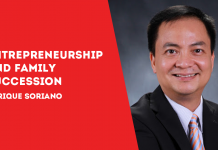
BY ENRIQUE SORIANO
ROBY, a second-generation family member, is the eldest child and the first to join the family business.
He started work in 1998, right after finishing university. He originally wanted to pursue his MBA overseas but decided to heed the request of his father to help them manage the family business.
The family was engaged in the import and export business then, but due to the sudden spike in foreign exchange, the business ended with a huge stockpile of inventory when overseas buyers suddenly stopped ordering.
Roby’s parents started the business in 1993, and just like many struggling small businesses, when the Asian Financial Crisis (AFC) struck, their lack of scale made them more vulnerable and increased their risk of failure when there was a prolonged downturn.
For those unfamiliar with the AFC that hit many economies in 1997, it was the runaway recession with sustained contractions of economic activity that was marked by declines in the gross domestic product (GDP). Businesses, both large and small, faced a significant drop in sales and profits, and despite repeated efforts to cut costs that included layoffs and cuts in capital spending, the lack of fresh capital effectively caused numerous companies to default and many ended up declaring bankruptcy with their assets liquidated.
In 2000, with the AFC still ravaging many countries and recovery still out of sight, Roby’s parents decided to shift to trading and real estate. After selling some of their assets and regaining their credit lines, Roby, in collaboration with his parents, began the tedious process of rebuilding their business.
One by one, the siblings also joined the business, with the exception of one who opted for a career in music. When the economy recovered, the new businesses also flourished. In 2005, Roby tied the knot at age 28.
Being the eldest and the most committed family member, Roby showed remarkable leadership early, thanks partly to his mother, who provided support and inspiration. While he acknowledged his father was the visionary, Roby was tasked to carry out the plans. He was also encouraged to think of new opportunities while steering the business to a new level of growth.
After getting advice from operating consultants, the father rotated Roby among the various departments. It was also around this time that he saw internal conflict first hand, mostly petty and personal issues that got blown out of proportion among employees and department managers.
He also saw how his siblings were operating their departments in silos.
“I know my siblings have good intentions but these ‘mini kingdoms’ are breeding disunity in the family business and papa ignored these red flags. What was clearly unacceptable was the fact that our compensation was based on the notion of equality rather than performance,” Roby exclaimed out of frustration during our first meeting.
He also expressed disappointment and said that due to the workload, he would log in early at 8 a.m. and go home at 8 p.m. He also rarely took a leave of absence while his siblings, on the other hand, were obviously less engaged and reported for work as they pleased.
“Some do not even ask permission anymore and we only discover through Facebook that they are out of the country with their friends or family,” said Roby.
He also confessed that the burden of addressing these internal issues rested heavily on his shoulders as his father would always dismiss them as petty when he raised these matters during meetings.
“All these issues were taking a toll on my health and even my relationship with my wife was somewhat affected,” said Roby.
Sensing a future conflict with his siblings, the wife sought my help after a client endorsed her./PN

